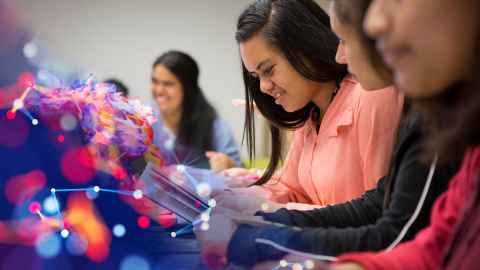Education and student experience
A pillar of Taumata Teitei, Vision 2030 and Strategic Plan 2025
On this page:
Overview
Students who embark on a University of Auckland research-informed education join an inclusive lifelong learning culture. They will be active participants in an educational environment that recognises and prioritises their changing life demands and preferences, and privileges human connections. They will learn from each other and participate in imaginative and innovative programmes designed by leading researchers in their disciplines and engaging with their fellow students in campus-based experiences.
Through the curriculum, and through the richness of experiences of University life, students will be highly connected to knowledges of place and conversant in mātauranga Māori, kaupapa Māori and Te Tiriti o Waitangi principles and accountabilities.
University of Auckland students are engaged in the design of their programmes, their learning experiences, the digital, social and physical contexts in which they learn and the myriad of cocurricular and extra-curricular opportunities that enhance student life, experience and learning.
As a result of our distinct educational experience, University of Auckland students and graduates will be notable for their leadership and high level of engagement in the contemporary concerns of society.
They will possess an intimate and deep sense of cultural identity, social justice and civic duty and sustainable practices, which will be demonstrable in their actions and interactions. Our graduates will stand apart from others in their readiness to play leading roles in public debate and in matters of relevance to our communities.

Priorities
- Accessible, equitable lifelong higher education opportunities
- Student-centric learning, co-curricular and extra-curricular cultures
- Education that is research-informed, transdisciplinary, relevant and with impact for the world
- Graduates who make the world better tomorrow than it is today
Strategic initiatives
Strategic initiatives for priority one
Accessible, equitable lifelong higher education opportunities
- Review offerings, scheduling, and delivery to improve access and retention to accommodate broader student needs and life stages, including:
- Improved pathways, timetabling, mode options, remote and community-based provision
- Improved retention and progression for Māori students and Pacific students
- Non-degree education opportunities for select needs
Category
Relevance and impact
Strategic initiatives for priority two
Student-centric learning, co-curricular and extra-curricular cultures
- Develop a student-centric education model for physical, digital, formal and informal learning activities enriched by professional and community co-curricular activities
- Extend informal social, professional and academic engagement between individuals, student cohorts, staff and the broader university community
- Review student representative systems to enhance the student voice
Category
Student Experience
- Revise appointments, continuation and promotions processes to select for, develop and reward high-quality teaching for all student cohorts
- Develop cultural competencies for all teaching staff
Category
Capability Development
Strategic initiatives for priority three
Education that is researchinformed, transdisciplinary, relevant and with impact for the world
- Develop current and new offerings in our areas of transdisciplinary focus for quality, viability, impact and strategic alignment
- Provide credit-bearing and partnered transdisciplinary, research-led, experiential, international and industry-based/Work Integrated Learning experiences for all students
- Develop programmes and student recruitment plans to rebalance education activity around transdisciplinary priorities
- With leaders in kaupapa Māori pedagogies and mātauranga Māori, include te ao Māori in programmes, teaching and the student experience, framed by Te Tiriti accountabilities
- Build academic staff capability in collaborative practice, transdisciplinary pedagogy, student engagement and success; honouring Te Tiriti; working with Pacific communities
- Improve support for selected pedagogical innovations and the scholarship of teaching and learning
Category
Relevance and impact
Strategic initiatives for priority four
Graduates who make the world better tomorrow than it is today
- Review the University Graduate Profile to ensure that it is current, ‘fit-for-purpose’ and gives clear expression to the full range of the University’s values and graduate capabilities
Category
Relevance and impact
Strategic initiatives for priorities one to four
Educational policies and processes supportive of strategy
- Undertake a phased review of policy and process to support above objectives ensuring:
- An annual cohesive executive-approved programme development pipeline and student recruitment plan;
- Student and staff centricity;
- Simplicity and fitness-for-purpose;
- Clear roles and responsibilities;
- Transparent risk, decision making and resourcing frameworks
Category
Framework for action